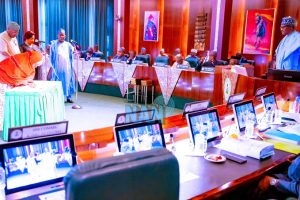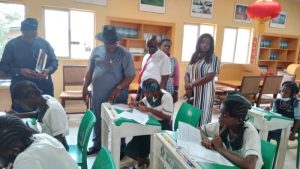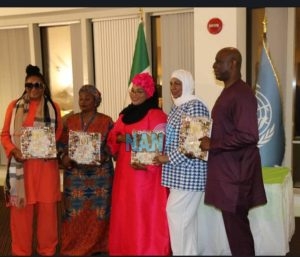Groups
-
adminposted in News & Trends • read more

Pauline TallenBy Justina Auta
The Minister of Women Affairs, Mrs Pauline Tallen, has been conferred with an award by the UN Global Women Foundation Advocacy for Change, a global body.
Mr Olujimi Oyetomi, the Director, Press and Public Relations, Federal Ministry of Women Affairs, disclosed this
in a statement on Wednesday in Abuja.He stated that the award is for her lifelong commitment toward building strong reach of service throughout the world.
Oyetomi added that the award was presented to the minister during the She Rises Forum on Empowering Women Economic Sustainability Through Entrepreneurship and Leadership holding on the wings of the 67th Session of UN Commission on the Status of Women in New York.
He said this special recognition by the global body adds to many that have been conferred on the Nigerian
Minister of Women Affairs.It is specially for her lifelong commitment to building strong reach of service throughout the world.
The passion and commitment of Dame Tallen to positively change the lives of women and girls is infectious.
It does not take long for anyone to stay around the Plateau State, Nigeria-born administrator and public
servant to detect her high level and tireless commitment and passion in this regard. (NAN)(www.nannews.ng)Edited by Abiemwense Moru/Hadiza Mohammed-Aliyu
Source: NAN News
-
adminposted in News & Trends • read more

Buhari swears-in ICPC Board membersBy Ismaila Chafe
President Muhammadu Buhari has sworn in seven members of the Board of the Independent Corrupt Practices and other related offences Commission (ICPC).
The News Agency of Nigeria (NAN) reports that the inauguration took place at the Council Chambers of the Presidential Villa, Abuja, on Wednesday.
The affected members include retried Justice Adamu Bello (Katsina State); Hannatu Mohammed (Jigawa); Olubukola Balogun (Lagos State); Obiora Igwedibia (Anambra); Dr Abdullahi Saidu (Niger); Yahaya Dauda (Nasarawa State) and Grace Chinda from Rivers.
The event preceded the commencement of the weekly meeting of the Federal Executive Council (FEC).
Those at the FEC meeting include Vice-President Yemi Osinbajo, Secretary to Government of the Federation, Boss Mustapha and the National Security Adviser, retired Maj-Gen. Babagana Monguno.
Others are Ministers of Works and Housing, Babatunde Fashola, Aviation, Hadi Sirika, Finance, Zainab Ahmed, Women Affairs, Pauline Tallen and that of the Federal capital Territory, Mohammed Bello among others. (NAN) (www.nannews.ng)
Edited by Joseph Edeh
Source: NAN News
-
adminposted in News & Trends • read more

By Taiye OlayemiThe Chinese Community in Nigeria in collaboration with Hua Xing Arts Troupe, Nigeria, has organised a symposium in celebration of the 2023 International Womens Day.
The symposium with the theme, Dedication to the Society and Embrace Equity, was aimed at celebrating womens achievements, raising awareness and creating opportunities that drive gender disparity.
This was done in collaboration with Harmony culture office of China General Chamber of Commerce in Nigeria.
In his welcome address, Chairman, Chinese Industrial and Commercial Enterprise Association, Dr Eric Ni, said that women are special creatures whose resilience and work must be continually celebrated.
Ni said, Today is a special day for us as Chinese Community in Nigeria, as we honour our women for their hard work and dedication.
Women are powerful and beautiful creatures but they are regarded as weaker than men, while they are blessed with power of creating life.
Let us accelerate equality initiative in all we do, let us also work towards creating a world where all women can thrive and fulfil their potential, and ensure gender equality and empowerment remains a priority, he said.
Zheng Yong, Director of the Office of the Chinese Consulate General in Lagos, congratulated all women on the celebration of the International Womens Day.
He encouraged all to embrace equity and work toward a future where women become more valued and respected.
Also speaking at the event, Assistant Commissioner of Police, Chioma Ajunwa, also Nigerias first Olympic gold medalist, urged women not to relent in their quest to transform the society.
Ajunwa said taking a critical look at the sports industry, women have truly blazed the trail and such achievements must be upheld and consciously built on.
She urged the men and government at all levels to give full support to women to further contribute to nation-building.
According to her, deliberate efforts must also be taken to celebrate women.
Men do not really celebrate their women well enough, they feel threatened by the achievements of the women but this should not be, we all should be able to have healthy relationships while contributing our quota to nation-building, she said.
Mrs Nneka Isaac-Moses, Managing Director, Goge Africa, who identified the strategic roles women had played in the society, advised the Federal Government to further encourage women participation in leadership positions.
Isaac-Moses said that if the society must be truly developed, women must not be sidelined but rather given equal opportunity as men, to contribute their quota in nation-building.
We observed that women are not given equal opportunities as the men, deliberately to guide against women taking over in virtually all aspects of human endeavour because the potential of the women have been noticed.
This is the time and age when we should jettison all forms of bias and allow women to engage their God-given potential to nurture and develop the society.
As women, we should consciously engage in training and retraining in all aspects of human endeavour to allow us contribute maximally to the growth of the nation, she said.
Also, the Vice Chairperson of the Chinese Women Association in Nigeria, Loi Eng-Koon, advocated innovative solutions to help women unleash their human capital.
The News Agency of Nigeria (NAN) reports that the Chinese Community donated N500,000 as scholarship to the Bethesda Home for the Blind.
No fewer than 100 Chinese and Nigerian women were in attendance, while there were colourful cultural presentations by the Chinese community like the Lion and Waist dance.(NAN) (nannews.ng)
Edited by Folasade Adeniran
Source: NAN News
-
adminposted in News & Trends • read more

Chief Executive, NMC, Prof. promise Mebine inspecting Students during a mathematics competitionBy Jacinta Nwachukwu
Prof. Promise Mebine, the Director/Chief Executive, National Mathematical Centre (NMC), has called on mathematics stakeholders to intensify efforts towards ensuring quality teaching and learning of the subject in schools.
Mebine made the call in an interview with the News Agency of Nigeria (NAN) on Tuesday in Abuja in commemoration of the International Day of Mathematics (IDM).
He says that Mathematics has proven to be a powerful tool for understanding the environment.
It helps us to understand patterns, quantify relationships, predict the future, predict profit, and study exponential growth and decay (the rate at which things grow and die) within the context of population growth, Mebine said.
According to him, mathematics is incredibly important in human lives and is used in many professions.
Every sane person does and uses mathematics, though many do not realise that. The theme for this years celebration is Mathematics for Everyone.
Truly, Mathematics is for everyone, though many people developed a phobia for it because of the general belief that it is abstract and difficult.
It is a statement of fact that mathematics is incredibly important in human lives and is used in many professions. Every sane person does and uses Mathematics, though many dont realise that, Mebine
said.He said Mathematics is involved when people cross the road too.
For instance, when you want to cross a road and there is an oncoming vehicle, what do you do? You take the following into consideration: estimate the distance between you and the vehicle.
The speed of the on-coming vehicle, the time it will take the vehicle to reach your crossing line and the time it will take you to cross. All these must be calculated and analysed, though mentally before crossing the road.
A good cook who wants to prepare food must take into consideration the number of people to be fed, the quantity of what he or she wants to cook, the size of the pot to use, and quantities of ingredients and water to make food tasty, Mebine said.
The director said these were some of the things people do in their everyday life without knowing they were practising mathematics.
He said that the importance of mathematics in everyones life cannot be over-emphasized, hence the need to make IDM worth looking forward to every year in the country.
Mebine said for this to be achieved, the celebration should not be left in the hand of NMC and a few organisations but all lovers and users of mathematics should include it in their annual programme.
March 14 of every year is set aside for all countries of the world to participate in the celebration of the beauty and importance of mathematics and its essential role in everyones life. (NAN)(www.nanews.ng)
==========
Edited by Razak OwolabiSource: NAN News
-
adminposted in News & Trends • read more

Vice President Yemi OsinbajoBy Chijioke Okoronkwo
Vice President Yemi Osinbajo says Nigerias technology ecosystem accounts for almost 30 per cent of Africas funded ventures with no fewer than 180 startups.
Osinbajo said this at the Official Inauguration of the Investment in Digital and Creative Enterprises (iDICE) Programme and Unveiling of iDICE logo on Tuesday at the State House Banquet Hall.
The vice president said that the iDICE is a government initiative to promote innovation and entrepreneurship in the digital tech and creative industries, especially targeted at job creation.
According to him, the total fund is 618 million dollars, out of which the AFDB provides 170 million dollars, the Agence Francaise de Development, 100 million dollars and the Islamic Development Bank (IsDB), 70 million dollars in co-financing.
The Bank of Industry (BOI) will provide 45 million dollars as Federal Governments counterpart contribution to be availed through loans for qualifying startups.
We expect another 271 million dollars from private sector and institutional investors.
I think it is important to mention that private capital has usually been ahead of government effort, the last few years have seen a consistent rise in venture capital investments in Nigerias technology ecosystem.
According to Disrupt Africas 2022 Tech Funding Report, Nigeria was the best-funded country in Africa for the second year running, with a minimum of 180 startups.
Making up approximately 30 per cent of Africas funded ventures, raising approximately one billion dollars substantially ahead of all other countries on the continent on both counts.
This influx of private capital has enabled startups to expand operations and create new jobs while contributing significantly toward overall Gross Domestic Product (GDP) growth of the country.
There are of course thousands of startups that have used private funds or debt that goes unrecorded.
He said it had become imperative to commence a coordinated approach toward innovation on the continent, bringing together all stakeholders to coordinate efforts at scaling up investments and building programmes that support innovation.
Osinbajo said that the government must provide more support for startups and small businesses while investors must provide more funding.
This is why the iDICE is important, it brings together the public sector, and our development partners the AfDB, IDB, and French Development Agency.
To design a Programme that supports innovation across very critical pillars including policy, infrastructure, access to finance and talent.
These pillars have been identified as very critical to the growth and sustenance of innovation on the continent.
As a government, we have consistently provided support to the innovation ecosystem over the last eight years, he said.
He said that in 2028, the Technology and Creativity Advisory Group was set up.
The vice president said that the group brought together stakeholders in the technology and creative industries, to contribute directly to policy formulation, articulation and the design of the technology and creative sectors of our economy.
He said that in Oct; 2022, President Muhammadu Buhari signed Nigerias Startup Bill into law, making it the Nigeria Startup Act.
Osinbajo said that the Act would provide a legal and institutional framework for the development of startups in Nigeria, and provide an enabling environment for growth of startups in the country.
On his part, AFDBs President, Akinwumi Adesina, said that the digital trends held great promise to help create massive number of jobs.
According to him, estimates by Endeavor (2022) show that expanding digital infrastructure by 10 per cent will lead to a 2.5 per cent annual growth in GDP in Africa.
Furthermore, expanding access to the internet in Africa from the current 33 per cent to 75 per cent can help create 44 million jobs, including three million jobs in online services by 2025.
We are already witnessing in Nigeria the power of digital technologies, tools, and platforms. Nigeria currently has five out of the 11 digital companies that have reached the status of unicorn with market valuation of one billion dollars.
Names that come to mind include Jumia, Interswitch, Opay, Flutterwave and Andela, mainly in the fintech space, he said.
In his remarks, Lai Mohammed, the Minister of Information and Culture, said that Nigerias creative industry was not about music and film.
He said the industry comprised other sectors such as advertising, hospitality, writing, comedy, photography, hair and beauty among others.
According to him, the industry employs millions of Nigerians.
While the music and film industry have combined to put Nigeria on the world map, in terms of revenue generation, fashion generates N2 trillion against musics N200 billion, hair and beauty generates N1.52 trillion against films N140 billion.
So, I hope that when we start administering these funds, we will look at these figures and we are very glad to share this report with the advisory council, he said.
Other speakers at the event included Niyi Adebayo, the Minister of Industry, Trade and Investment, Zainab Ahmed, the Minister of Finance, Budget and National Planning and representative of Minister of Communications and Digital Economy, Isa Pantami.
Olukayode Pitan, the Managing Director, Bank of Industry (BoI), and representatives of French Development Agency and IsDB also spoke at the event. (NAN)(www.nannews.ng)
==============
Edited by Ese E. Eniola WilliamsSource: NAN News
-
adminposted in News & Trends • read more

Mrs Zainab Marwa (middle) with other dignitaries at the unveiling of 101 Nigerian Women of Impact in New YorkSource: NAN News
-
adminposted in News & Trends • read more

Fire outbreak at Singer Market, KanoBy Bosede Olufunmi
The Federal Fire Service (FFS) said it would inaugurate fire stations within the markets across the country.
The Zonal Controller, FFS in charge of Kano and Jigawa, Assistant Controller General (ACG), Ahmed Garba-Karaye, stated this when he visited Singer Market to assess the level of damage caused by fire on Monday in Kano.
He said the service was committed to prevent and control fire.
According to him, investigation, Inspectorate and Enforcement (IIE) will inspect and ensure fire safety compliance in public buildings.
Rising cases of fire outbreaks in Kano market is as a result of high weather temperature and substandard electric appliances.
Excessive heat, fuel and oxygen as major catalysts of fire triangle and heat can trigger fire without the presence of fuel, kerosene or diesel, he said.
The Zonal Controller said shops should be well ventilated as congestion could also escalate heat and cause fire.
He urged market leaders to enlighten business owners through signs and announcements, the importance of switching off electric appliances before closing for business.
Garba-Karaye also called on philanthropists and wealthy individuals to contribute their quota, by providing firefighting equipment as part of their corporate social responsibilities.
He advised traders to always be at alert and conscious of fire. (NAN)(www.nannews.ng)
Edited by Emmanuel Afonne/Idris Abdulrahman
Source: NAN News
-
adminposted in News & Trends • read more

Nigerian Ports Authority (NPA) headquartersBy Chiazo Ogbolu
The Nigerian Ports Authority (NPA) has commended the Maritime Workers Union of Nigeria (MWUN) for support in ensuring salaries of NPA members of staff were increased.
The Managing Director, NPA, Mr Mohammed Bello-Koko in a statement in Lagos on Tuesday, noted that the salary of workers had been stagnated since 2008.
Bello-Koko stated this when he received a letter referenced MWUN/MD/NPA/RFC/23, dated March 6, signed by the Secretary General MWUN, Comrade Adewale Adeyanju, expressing appreciation to management of the authority for the increment in the salary of its members.
The NPA boss said that breaking the jinx of salary stagnation suffered over a decade by the authoritys employees was made possible by the support of the MWUN.
He noted that the authority remained appreciative of the support by the union.
This critical support from MWUN has buoyed us to intensify our relentless drive toward continuous improvement in the welfare of our esteemed workers in ways not limited to monthly salary alone.
We are further delighted by the fact that our own Adeyanju is now the Deputy President of the NLC.
This gives us the necessary solidarity and backing to push for more benefits for our highly valued human resources, he said.
It would be recalled that the NPA managing director had in November 2022, been accompanied by Adeyanju to pay an advocacy visit to the headquarters of the Nigerian Labour Congress (NLC) to solicit the unions solidarity toward increase in NPA workers salaries. (NAN)(www.nannews.ng)
============
Edited by Chioma UgbomaSource: NAN News
-
adminposted in News & Trends • read more

Chief of Army Staff, Lt.-Gen. Faruk YahayaBy Sumaila Ogbaje
The Chief of Army Staff (COAS), Lt.-Gen. Faruk Yahaya, has urged officers and men of the Nigerian Army to remain professional and above board in their conducts during the March 18 elections.
Yahaya gave the directive at the opening of the 4th Career Planning and Management Seminar organised by the Army Headquarters Department of Military Secretary, on Tuesday in Abuja.
The Chief of Training (Army) Maj.-Gen. Sani Mohammed represented the COAS at the seminar with the theme, Efficient Human Resource Management: Imperatives for a Professional Nigerian Army in the 21st Century.
He said the seminar was organised to ensure efficient career planning to engender good leadership among officers.
This, he said, became very imperative in view of the involvement of the army in several operations.
According to him, significant changes in organisational and leadership have evolved globally, as such it is important for the military to improve approaches to career planning and human resource management.
This would ensure a balanced and rewarding career path for officers, he added.
Yahaya said the seminar was to create awareness and sensitise officers on new policies that might impact on their career and address other salient career planning issues for better understanding.
As members of the armed forces, we should be mindful of the need to adequately prepare officers to operate in joint environment.
And deploy them to positions where they can efficiently develop novel plans, processes, strategies to meet the changing nature of the battlespace.
Therefore, it is imperative that we maintain momentum while motivating our officers and men through an efficient and balanced career planning process, the COAS said.
He also emphasised the need for all army personnel to remain apolitical and professional.
The COAS said great efforts have been made to ensure that the conduct of our officers and men during the polls remains professional and above board.
I therefore urge you to uphold the highest professional conduct during this period.
In his remarks, the Military Secretary (Army), Maj.-Gen. Jamil Abdulsalam, said the annual seminar was to ensure efficient management of the careers of army officers.
Abdulsalam said the department had overtime, observed that most officers within the mid level cadre treated matters of career with levity, often leading to unpleasant consequences.
He said that upward trend, where annual evaluation reports from formations and units as well as course reports from most army training institutions fell short of realistic reportage, had been of great concern.
According to him, the shortcomings are further compounded by the involvement of the army in wide range of operations and the resultant dearth of officers for deployment to key areas.
All of these factors have significantly affected career planning and complicated the military human resource management approach of the Department of Military Secretary.
Customarily, the department conducts sensitisation visits to Nigerian army formations and training schools, including operational areas to enhance officers understanding of the requirements for career growth.
This forum offers a unique opportunity to have a convergence of seasoned resource persons and key players in the management of army officers careers to share experiences and update you on extant policies and provisions that may impact on your careers.
The seminar will feature packages that will expose participants to contemporary approaches to military human resource management with a view to improve career planning at all levels.
The issue of conduct and discipline, which remains a key consideration in the career planning process, as well as gender perspectives have been added to make the seminar wide-ranging, balanced and rich in context, he said. (NAN) ()
Edited by Maharazu Ahmed
Source: NAN News
-
adminposted in News & Trends • read more

By Ikenna Osuoha
Save Our Heritage Initiative (SOHI), an Abuja based NGO, has advised Nigerian politicians and voters to be peaceful and play the game of politics by the rules.Ms May Ikokwu, Chief Executive Officer (CEO) of the group gave the advice in an interview with the News Agency of Nigeria (NAN) in Abuja on Monday.
Ikokwu urged them not to allow their personal ambitions jeopardise the unity and peace of the country especially during the forthcoming governorship and state assembly elections .
She appealed to the political class not to exploit the countrys diversity negatively to advance their personal ambitions.
We should emphasise those things that unite us more than the ones that divide us.
Politics is a game that will come and go but Nigeria remains, so let us prioritize Nigerias unity and harmony above personal ambitions.
Clean politics is part of our heritage and a legacy that we should aspire to leave for the future generations, she advised.
The Culture Advocate who warned against political violence and animosity, said that it was alien to Nigerias indigenous political culture.
She urged politicians to close ranks among each other in accordance with Nigerias culture of brotherly love.
Ikokwu also called on the Independent National Electoral Commission (INEC) to restore confidence of the electorate by allowing votes count.
She explained that only transparent and credible election would truly reflect the will and wish of the people.
According to her, Nigeria should demonstrate their position as giant of Africa by conducting peaceful, credible gubernatorial elections.
Ikokwu however commended Nigerians for their commitment to stronger democratic process.
The News Agency of Nigeria (NAN) reports that Nigerias Gubernatorial elections would be conducted on March 18. (NAN) www.nannews.ng
=======
Edited by Auwalu Birnin Kudu/Ekemini Ladejobi
Source: NAN News